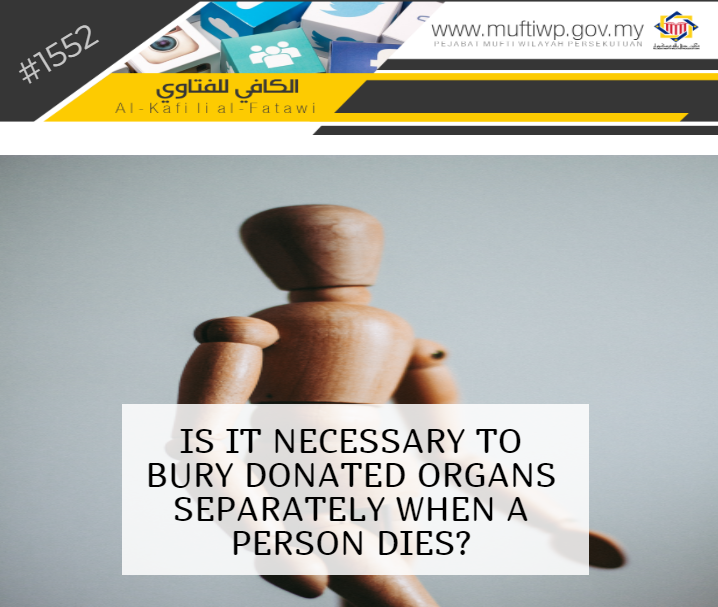Question:
Assalamualaikum wbt,
Is it wajib to extract the organs received in organ transplant such as the kidney when the recipient passes away and should it be buried separately?
Answer:
Waalaikumussalam wbt,
Alhamdulillah, praise and thanks to Allah for the countless blessings He has blessed us all with. Blessings and salutations to the Prophet Muhammad PBUH, his wives, his family, companions and all those that follow his teachings to the day of judgement
Scholars have differing opinions regarding operation performed on a deceased to harvest the bones or organs to save other living people. Imam Syihabuddin al-Ramli Rahimahullah commented on the words of Imam al-Nawawi, saying:
وَعَظْمُ غَيْرِهِ مِنْ الْآدَمِيِّينَ فِي تَحْرِيمِ الْوَصْلِ بِهِ وَوُجُوبِ نَزْعِهِ كَالْعَظْمِ النَّجِسِ، وَلَا فَرْقَ فِي الْآدَمِيِّ بَيْنَ أَنْ يَكُونَ مُحْتَرَمًا أَوْ لَا كَمُرْتَدٍّ وَحَرْبِيٍّ خِلَافًا لِبَعْضِ الْمُتَأَخِّرِينَ، فَقَدْ نَصَّ فِي الْمُخْتَصَرِ بِقَوْلِهِ: وَلَا يَصِلُ إلَى مَا انْكَسَرَ مِنْ عَظْمِهِ إلَّا بِعَظْمِ مَا يُؤْكَلُ لَحْمُهُ ذَكِيًّا، وَيُؤْخَذُ مِنْهُ أَنَّهُ لَا يَجُوزُ الْجَبْرُ بِعَظْمِ الْآدَمِيِّ مُطْلَقًا، فَلَوْ وَجَدَ نَجِسًا يَصْلُحُ وَعَظْمَ آدَمِيٍّ كَذَلِكَ وَجَبَ تَقْدِيمُ الْأَوَّلِ، وَخِيَاطَةُ الْجُرْحِ وَمُدَاوَاتُهُ بِالنَّجِسِ كَالْجَبْرِ فِي تَفْصِيلِهِ الْمَذْكُورِ.
“And starting with other bones, such as the bone of the son of Adam, the same with the ruling of the usage of najis bone on its prohibition as a connector and the obligation to remove it. There is no difference if it is harvested (form the donor) whether he is honoured or otherwise, such as the apostate and kafir harbi, but this contradicts the opinions of contemporary scholars. (Imam al-Nawawi) stated in al-Mukhtasar saying: It is impermissible for a person to connect what has been broken/destroyed from his bones, unless using an animal bone that is permissible to be eaten when slaughtered. It is understood from here that it is impermissible to strengthen (the bone) with human bone in an absolute manner. Thus, when there is najis element that has the same function with (the quality) of human bone (to strengthen), then it is wajib to prioritize the first element (the najis element). The same for surgical sutures and medicines made from najis, then the ruling is the same as al-jabr (strengthen)(which is prioritized).” Refer Nihayah al-Muhtaj (2/222)
The statement is further explained by Syeikh Ali al-Syabramalisi in his Hasyiah:
ثُمَّ ظَاهِرُ إطْلَاقِ جَوَازِ الْوَصْلِ لِعَظْمِ الْآدَمِيِّ أَنَّهُ لَا فَرْقَ فِي ذَلِكَ بَيْنَ كَوْنِهِ مِنْ ذَكَرٍ أَوْ أُنْثَى، فَيَجُوزُ لِلرَّجُلِ الْوَصْلُ بِعَظْمِ الْأُنْثَى وَعَكْسُهُ، ثُمَّ يَنْبَغِي إذَا مَسَّهُ هُوَ أَوْ غَيْرُهُ، فَإِنْ اكْتَسَى لَحْمًا وَحَلَّتْهُ الْحَيَاةُ صَارَ حُكْمُهُ حُكْمَ بَقِيَّةِ أَجْزَاءِ الرَّجُلِ فَلَا يُنْتَقَضُ وُضُوءُهُ وَلَا وُضُوءُ غَيْرِهِ مِنْ الرِّجَالِ بِمَسِّهِ، وَإِنْ كَانَ ظَاهِرًا مَكْشُوفًا وَلَمْ تَحِلَّهُ الْحَيَاةُ فَهُوَ بَاقٍ عَلَى نِسْبَتِهِ لِلْأُنْثَى، وَمَعَ ذَلِكَ لَا يُنْتَقَضُ وُضُوءُهُ وَوُضُوءُ غَيْرِهِ بِمَسِّهِ؛ لِأَنَّ الْعُضْوَ الْمُبَانَ لَا يُنْتَقَضُ الْوُضُوءُ بِمَسِّهِ إلَّا إذَا كَانَ مِنْ الْفَرْجِ وَأَطْلَقَ اسْمَهُ عَلَيْهِ
“Then from what can be observed from the itlaq of the statement on the permissibility of connecting using human bone, then there is no difference in its ruling, regardless of whether the bone is a man’s or a woman’s. Thus, it is permissible for a man to connect his bones with the bone of a woman and vice versa. Then it should be known that if the man touches the connection or others touch it; the bone has been covered with flesh and skin and there is a lifetime for it, then the connection is considered the same as the man’s other body parts. Thus, it does not invalidate the man’s ablution nor the ablution of others who touch it. And if it is located on the outer surface of the body and is exposed and there is no lifetime for it, then it is still considered as the donor’s (woman). However, it does not invalidate the ablution of the man (recipient) nor other men who touch it, for detached limbs do not invalidate the ablution of those who touch it unless it is the private parts (vagina, penis or anus) and the itlaq remains.” Refer Hasyiah Nihayah al-Muhtaj (2/222)
Thus, Syeikh Sulaiman al-Bujairami stated in his Hasyiah:
وَالْمُعْتَمَدُ أَنَّ الْعُضْوَ الْمُبَانَ مَتَى الْتَصَقَ وَحَلَّتْهُ الْحَيَاةُ نَقَضَ وَإِلَّا فَلَا .... فَإِذَا الْتَصَقَتْ يَدُ رَجُلٍ بِبَدَنِ امْرَأَةٍ وَحَلَّتْهَا الْحَيَاةُ انْتَقَضَ وُضُوءُ الرَّجُلِ صَاحِبِ الْيَدِ بِلَمْسِهَا
“The final opinion stated that detached limbs that are reattached and regains its functions will invalidate ablution. If it does not regain its function, then it does not invalidate ablution. Hence, if a man’s hand is attached to a woman and the hand regain its motor functions, then the ablution of the man (original owner of the hand) will be invalidated if he touches the hand.” Refer Hasyiah al-Bujairami `ala Syarh al-Manhaj (1/44)
Whereas the First National Muzakarah Council for Religious Matters which convened on 23-24th June 1970 discussed the issue of Heart and Cornea Transplant. The Muzakarah has decided that heart and corneal transplant from a deceased to a living person is permissible in Islam and it must follow the following considerations:
- In an exigent situation and there is a necessity for it, where the recipient’s life depended on the transplant and the transplant is expected to be successful.
- For heart transplant, the donor’s death must first be confirmed before the heart is transplanted.
- Necessary precautions should be taken so that it will not lead to murder or organ trafficking.
- Permission from the donors should be taken before transplant is performed in natural death cases or from family members for death due to accidents.
According to the above facts and discussion, organ donation is permissible following the conditions for it. While donated organs is considered as a part of the recipient’s body when the organ regained its function in the new body. Thus, it is not sanctioned to surgically remove the organ and bury it separately when the recipient passes away, where it is even considered as dishonouring the deceased and is prohibited in syarak. Wallahua’lam.
Hopefully, this explanation will give understanding to us all.


